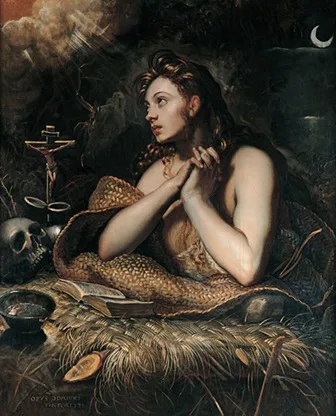Challenging the Patriarchal Narrative
Mary Magdalene has long been a figure of fascination and controversy in Christian history. Often misrepresented and misunderstood, she is a central figure in the early Christian movement. The discovery of the Gospel of Mary Magdalene—an apocryphal text that highlights her role as a spiritual leader—has challenged traditional patriarchal narratives within Christianity. In this article, we explore Mary Magdalene and her gospel, examining how this text reshapes our understanding of her significance and challenges established views on women’s roles in early Christianity.
The Historical Mary Magdalene: Separating Fact from Fiction
Mary Magdalene’s image has been shaped by centuries of misinterpretation. Often depicted as a repentant prostitute, this portrayal has little basis in historical fact. In reality, Mary was a close follower of Jesus, witnessing his crucifixion and being the first to see the resurrected Christ.
Debunking the Myths Surrounding Mary Magdalene
The misconception of Mary Magdalene as a prostitute stems from a conflation of her with other women in the Gospels. In the 6th century, Pope Gregory the Great contributed to this misunderstanding by identifying her with the unnamed sinful woman in Luke’s Gospel. This association, however, lacks biblical support and has since been corrected by modern scholarship.
Mary Magdalene’s True Role in Early Christianity
Far from being a mere repentant sinner, Mary Magdalene was a prominent disciple and a key figure in the early Christian community. The Gospels of Matthew, Mark, Luke, and John all depict her as a close companion of Jesus. She was present at the crucifixion and was the first to witness the resurrection, making her the “apostle to the apostles.” Her significant role suggests that she held a position of influence among the early followers of Jesus.
The Gospel of Mary Magdalene: An Apocryphal Text with Radical Implications
The Gospel of Mary Magdalene, discovered in the late 19th century, offers a radically different view of Mary’s role in the early church. Although not included in the New Testament canon, this text is crucial for understanding the spiritual dynamics of early Christianity.
What Is the Gospel of Mary Magdalene?
The Gospel of Mary Magdalene is an apocryphal text written in the early centuries of Christianity. It provides insights into the teachings of Jesus as conveyed through Mary Magdalene, highlighting her role as a spiritual leader. The gospel is composed of fragmented teachings and dialogues between Mary and the disciples, emphasizing her deep understanding of Jesus’s teachings.
The Theological Significance of the Gospel
The Gospel of Mary Magdalene presents a vision of Christianity that diverges from orthodox teachings. It emphasizes inner spiritual knowledge (gnosis) over external rituals and promotes a direct, personal relationship with the divine. This focus on inner knowledge aligns with Gnostic traditions, which were often at odds with the emerging orthodox Christian doctrines. The text challenges the idea of a strictly hierarchical church, instead advocating for a more inclusive and egalitarian approach to spirituality.
Mary Magdalene’s Leadership and the Challenge to Patriarchy
One of the most striking aspects of the Gospel of Mary Magdalene is its portrayal of Mary as a spiritual leader who challenges the authority of the male disciples. In the text, Peter questions Mary’s authority, but Levi defends her, acknowledging her deep spiritual insight. This interaction reflects early tensions within the Christian community regarding the role of women. The gospel suggests that Mary’s spiritual authority was recognized by some, challenging the patriarchal structure that later dominated the church.
Rewriting the Narrative: The Impact of Mary Magdalene’s Gospel on Modern Christianity
The Gospel of Mary Magdalene has profound implications for modern Christianity. It invites us to reconsider the role of women in the church and challenges long-held assumptions about spiritual authority.
Feminist Interpretations of the Gospel
Feminist scholars have embraced the Gospel of Mary Magdalene as a vital text for understanding women’s roles in early Christianity. The gospel’s emphasis on Mary’s leadership and spiritual insight offers a counter-narrative to the male-dominated history of the church. By recognizing Mary as a legitimate spiritual authority, feminist theologians argue for a reevaluation of women’s roles within modern Christian communities.
The Relevance of Mary Magdalene’s Gospel Today
The themes of the Gospel of Mary Magdalene—inner spiritual knowledge, egalitarianism, and the challenge to patriarchal structures—remain relevant today. In an era where questions of gender equality and inclusivity are at the forefront, Mary Magdalene’s gospel offers a powerful message. It encourages a move towards a more inclusive church, where spiritual authority is not limited by gender.
Practical Applications: Embracing the Lessons of Mary Magdalene’s Gospel
For those interested in integrating the teachings of the Gospel of Mary Magdalene into their spiritual practice, here are some practical steps:
- Study the Text: Begin by reading the Gospel of Mary Magdalene and reflecting on its teachings. Consider how Mary’s insights can inform your spiritual journey.
- Promote Inclusivity: Encourage discussions on the role of women in the church and advocate for greater inclusivity in spiritual leadership.
- Embrace Inner Spiritual Knowledge: Focus on developing a personal relationship with the divine, prioritizing inner wisdom over external rituals.
- Challenge Patriarchal Structures: Work towards creating more egalitarian spiritual communities that value contributions from all members, regardless of gender.
Connecting with Mary Magdalene’s Legacy
Mary Magdalene’s story and her gospel offer a rich legacy of spiritual leadership and challenge to established norms. By engaging with her teachings, modern believers can find inspiration for creating a more inclusive and spiritually vibrant community. Mary Magdalene’s gospel is not just a relic of the past; it is a living document that continues to inspire and challenge us today.


2 responses to “Mary Magdalene and Her Gospel”
Fantastic.
I would love to read whatever you have on Mary Magdalene’s gospel. I don’t think she was a prostitute. I think that Jesus healed her of over a half dozen demons, after which she became his follower.